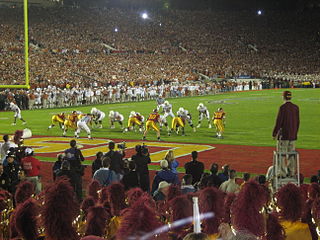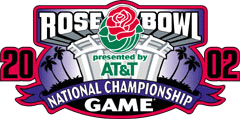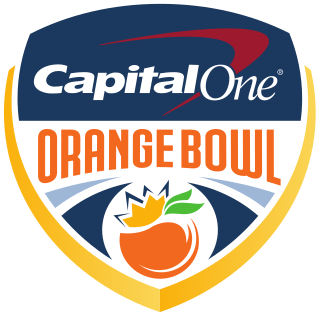Related Research Articles

The Fiesta Bowl is an American college football bowl game played annually in the Phoenix metropolitan area. From its beginning in 1971 until 2006, the game was hosted at the Sun Devil Stadium in Tempe, Arizona. Since 2007, the game has been played at the State Farm Stadium in Glendale, Arizona. Since 2022, it has been sponsored by Vrbo and officially known as the Vrbo Fiesta Bowl. Previous sponsors include PlayStation, BattleFrog, Vizio, Tostitos, IBM (1993–1995) and Sunkist (1986–1990).

The Sugar Bowl is an annual American college football bowl game played in New Orleans, Louisiana. Played annually since January 1, 1935, it is tied with the Orange Bowl and Sun Bowl as the second-oldest bowl games in the country, surpassed only by the Rose Bowl Game.

The Bowl Championship Series (BCS) was a selection system that created four or five bowl game match-ups involving eight or ten of the top ranked teams in the NCAA Division I Football Bowl Subdivision (FBS) of American college football, including an opportunity for the top two teams to compete in the BCS National Championship Game. The system was in place for the 1998 through 2013 seasons and in 2014 was replaced by the College Football Playoff under its original four-team format.

In North America, a bowl game, or simply bowl, is one of a number of postseason college football games that are primarily played by teams belonging to the NCAA's Division I Football Bowl Subdivision (FBS). For most of its history, the Division I Bowl Subdivision had avoided using a playoff tournament to determine an annual national champion, which was instead traditionally determined by a vote of sports writers and other non-players. In place of such a playoff, various cities across the United States developed their own regional festivals featuring postseason college football games. Prior to 2002, bowl game statistics were not included in players' career totals. Despite attempts to establish a permanent system to determine the FBS national champion on the field, various bowl games continue to be held because of the vested economic interests entrenched in them.
The College Football Bowl Coalition was formed through an agreement among Division I-A college football bowl games and conferences for the purpose of forcing a national championship game between the top two teams and to provide quality bowl game matchups for the champions of its member conferences. It was established for the 1992 season after there were co-national champions for both 1990 and 1991. The agreement was in place for the 1992, 1993, and 1994 college football seasons. It was the predecessor of the Bowl Alliance (1995–1997), and later the Bowl Championship Series (1998–2013) and the College Football Playoff.
The Bowl Alliance was an agreement among college football bowl games for the purpose of trying to match the top two teams in a national championship game and to provide quality bowl game matchups for the champions of its member conferences. The agreement was in place for the 1995, 1996, and 1997 seasons and had replaced the Bowl Coalition. Each participating team in the Bowl Alliance Championship received $8.5 million from the television sponsors.

The BCS National Championship Game, or BCS National Championship, was a postseason college football bowl game, used to determine a national champion of the NCAA Division I Football Bowl Subdivision (FBS), first played in the 1998 college football season as one of four designated bowl games, and beginning in the 2006 season as a standalone event rotated among the host sites of the aforementioned bowls.

The Power Four conferences, known from 2014 to 2023 as the Power Five conferences, are the most prominent athletic conferences in college football in the United States. They are part of the Football Bowl Subdivision (FBS) of NCAA Division I, the highest level of collegiate football in the nation, and are considered the most elite conferences within that tier. The Power Four conferences have provided most of the participants in the College Football Playoff since its inception, and generally have larger revenue, budgets, and television viewership than other college athletic programs.
The teams that participate in the National Collegiate Athletic Association's Division I Football Bowl Subdivision earn the right to compete in a series of post-season games called bowl games. As of 2023, there are 42 bowl games, and all are contractually obligated to offer bids to specific conferences, a situation known as a "tie-in". The "top" six bowl games in the nation select their teams as part of the College Football Playoff (CFP), which was put into place for a minimum of 12 years, beginning with the 2014 season. Prior to 2014, the top five games in the country were chosen under the system known as the Bowl Championship Series. The bowls outside of the CFP have individual contracts with the conferences to offer preferential bids to teams from those conferences. As long as teams are bowl eligible, they may be selected by these bowls to meet these contracts.

The 2004 NCAA Division I-A football season was the highest level of college football competition in the United States organized by the National Collegiate Athletic Association (NCAA). The regular season began on August 28, 2004 and ended on December 4, 2004. The postseason concluded on January 4, 2005 with the Orange Bowl, which served as the season's Bowl Championship Series (BCS) National Championship Game.

The 2002 Rose Bowl, played on January 3, 2002, was a college football bowl game. It was the 88th Rose Bowl game and was the BCS National Championship Game of the 2001 college football season. The game featured the Miami Hurricanes and the Nebraska Cornhuskers, marking the first time since the 1919 Rose Bowl, and only the third time in the game's history, that neither the Big Ten nor the Pac-10 Conferences had a representative in this game. The Hurricanes won the game, 37–14, for their fifth national title. Miami quarterback Ken Dorsey and wide receiver Andre Johnson were named the Rose Bowl Players of the Game.
The 2003 Rose Bowl was a college football bowl game played on January 1, 2003. It was the 89th Rose Bowl game. It was a match-up between the Oklahoma Sooners and the Washington State Cougars. Oklahoma led 27–0 in the fourth quarter and won, 34–14. Sooner quarterback Nate Hybl was named the Player Of The Game.
The Bowl Championship Series (BCS) was a selection system used between 1998 and 2013 that was designed, through polls and computer statistics, to determine a No. 1 and No. 2 ranked team in the NCAA Division I Football Bowl Subdivision (FBS). After the final polls, the two top teams were chosen to play in the BCS National Championship Game which determined the BCS national champion team, but not the champion team for independent voting systems. This format was intended to be "bowl-centered" rather than a traditional playoff system, since numerous FBS Conferences had expressed their unwillingness to participate in a play-off system. However, due to the unique and often esoteric nature of the BCS format, there had been controversy as to which two teams should play for the national championship and which teams should play in the four other BCS bowl games. In this selection process, the BCS was often criticized for conference favoritism, its inequality of access for teams in non-Automatic Qualifying (non-AQ) Conferences, and perceived monopolistic, "profit-centered" motives. In terms of this last concern, Congress explored the possibility on more than one occasion of holding hearings to determine the legality of the BCS under the terms of the Sherman Anti-Trust Act, and the United States Justice Department also periodically announced interest in investigating the BCS for similar reasons.
The 1989 Sunkist Fiesta Bowl, played on Monday, January 2, was the 18th edition of the Fiesta Bowl. It featured the top-ranked Notre Dame Fighting Irish and the third-ranked West Virginia Mountaineers. With both teams undefeated, the Fiesta Bowl was the stage for the "national championship" for the second time in three years. As in 1987, the Fiesta Bowl featured two independents squaring off for the national title. The Fighting Irish defeated the Mountaineers to win their first national championship since 1977, and their most recent to date.

A national championship in the highest level of college football in the United States, currently the NCAA Division I Football Bowl Subdivision (FBS), is a designation awarded annually by various organizations to their selection of the best college football team. Division I FBS football is the only National Collegiate Athletic Association (NCAA) sport for which the NCAA does not host a yearly championship event. As such, it is sometimes referred to as a "mythical national championship".
The college football playoff debate was a very hot topic of discussion concerning college football in the United States prior to 2012. This debate—among fans, journalists, conference representatives, government officials, university administrators, coaches and players—concerned whether or not the postseason format of NCAA Division I-A should be changed or modified.

The Orange Bowl is an annual American college football bowl game that has been played annually in the Miami metropolitan area since January 1, 1935. Along with the Sugar Bowl and the Sun Bowl, it is one of the oldest bowl games in the country behind only the Rose Bowl, which was first played in 1902 and has been played annually since 1916.

The College Football Playoff (CFP) is an annual postseason knockout invitational tournament to determine a national champion for the National Collegiate Athletic Association (NCAA) Division I Football Bowl Subdivision (FBS), the highest level of college football competition in the United States. It culminates in the College Football Playoff National Championship game. The inaugural tournament was held at the end of the 2014 NCAA Division I FBS football season under a four-team format. The CFP Board of Managers voted in 2023 to expand the playoff to twelve teams beginning in 2024, an arrangement that will last at least through the end of the 2025 season. After 2025, the current contract between all major players expires and a new contract will be drawn up, with indications that additional expansion may take place as soon as 2026.

The New Year's Six, sometimes abbreviated as NY6, are the following NCAA Division I Football Bowl Subdivision (FBS) bowl games: the Rose Bowl, Sugar Bowl, Orange Bowl, Cotton Bowl, Peach Bowl, and Fiesta Bowl. These games are played annually on or around New Year's Day and represent six of the ten oldest bowl games played at the FBS level.
References
- ↑ Barnhouse, Wendell (December 26, 2004). "Weiberg doesn't see a playoff in BCS future". Fort Worth Star-Telegram . p. 9C. Retrieved October 5, 2024– via newspapers.com.
- 1 2 Greenstein, Teddy (December 26, 2004). "BCS may be flawed, but it's better than alternative". Green Bay Press-Gazette . Chicago Tribune. p. C-8. Retrieved October 5, 2024– via newspapers.com.
- ↑ "Franchione advocates BCS plus one system". The Morning News . Florence, South Carolina. AP. January 5, 2002. p. 3-C. Retrieved October 6, 2024– via newspapers.com.
- ↑ Rohde, John (January 1, 2004). "Weiberg hopes to tweak BCS as new chairman". The Oklahoman . p. 9C. Retrieved October 6, 2024– via newspapers.com.
- ↑ Eisenberg, John (January 1, 2005). "Busted BCS system has a cloudy future". The Baltimore Sun . p. C4. Retrieved October 5, 2024– via newspapers.com.
- ↑ Wieberg, Steve (December 8, 2003). "Co-champs loom after Oklahoma, LSU chosen for Sugar Bowl; Southern California, No. 1 in human polls, left to Rose Bowl" . USA TODAY . p. A1. ProQuest 408915128 . Retrieved May 7, 2024.
Today's confusion may lend momentum to one proposed revision already on the table: adding a stand-alone title game after the four current bowls (Sugar, Federal Express Orange, Tostitos Fiesta and Rose). Simply run the poll-and-computer numbers again to identify a final No. 1 and No. 2 to meet for the title. With that, the Sugar, Orange, Fiesta and Rose would constitute a sort of semifinal round. 'A plus-one type of championship,' says Big 12 Commissioner Kevin Weiberg, who'll become the BCS' coordinator next season, 'might help sort it out.'
- ↑ Brown, Chip (December 11, 2003). "'Plus one' gaining favor". The Bryan-College Station Eagle . The Dallas Morning News. p. B1. Retrieved October 5, 2024– via newspapers.com.
- ↑ Dubow, John (January 6, 2004). "Nothing right with BCS formula". Daily Herald . Provo, Utah. AP. p. C5. Retrieved October 6, 2024– via newspapers.com.